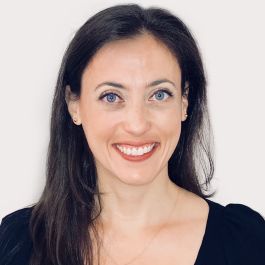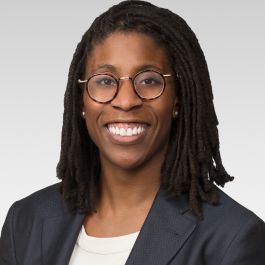Aviva Fink knows what it feels like to be the only woman in a room.
Upon entering the proptech space about a decade ago, Fink said she found herself surrounded mostly by men, whether it was in a meeting or at a conference. And, as is the case for other women, the sense of underrepresentation she felt affected her as a young professional.
“It feels a little lonely when you don’t have peers that you can look to who are more senior and say, ‘I can be like them,’ or you don’t necessarily have the same talk track that helps you build rapport,” Fink said. “That can be a daunting thing for someone who’s trying to navigate their career.”
Fast forward nearly 10 years later, and Fink is a leader within her field. As vice president of business development and partnerships at commercial real estate data and insights company Reonomy, she currently supports the company’s efforts to bring more diverse talent into the organization and provide greater outlets for women at the company to advance their careers.
Her leadership requires more than intelligence and ingenuity, though. According to her, Reonomy has given her the space she needs to make an impact and ensure inclusivity remains at the forefront of the company’s operations.
Fink’s growth journey is a common one for women at Reonomy. For Vice President of Legal Ezinne Okpo and Vice President of Operations Hayley Halversson, the company has not only given them the opportunity to grow within their careers but has also enabled them to drive change across the organization.
Together, these leaders have paved the way for a more equitable future at Reonomy. Whether they’re developing a roadmap for more inclusive meetings or updating the hiring process, each of them does their part to make sure transformation remains a mainstay of the company’s culture.
Fink, Okpo and Halversson gave us an inside look at the ways in which the company empowers its people to grow and drive change, and shared their thoughts on the challenges they’ve faced — and overcome — as women leaders.

Since joining the company, how have you been able to sharpen your skills and/or confidence?
Fink: Late 2019 into 2020 was an exciting turning point for the business, during which time we redesigned and pivoted our strategy and started thinking differently about our operations, and that happened to be timed very closely with the start of the pandemic. For me, it’s not only thinking about how I’m helping facilitate these strategic updates and helping move marketing and business development and partnership strategies in line with these new company goals. It’s also thinking about how we’re going to get cross-departmental alignment, create a motivated workforce during a pandemic and maintain culture as we continue to adapt and grow our team.
Okpo: This is my first position at a company as an in-house legal role. I’ve had to sort of find that balance of providing great legal advice experience to my colleagues while also maintaining the balance of risks and enabling the business at the same time. All of those things require new skill sets and communication in different ways, and I’ve definitely been able to upskill in all of those facets.
Halversson: One thing I really like about the startup world, and one of the reasons I’ve chosen to grow my career there, is that hiring doesn’t always happen because you have industry expertise or deep experience in a particular area.
I was brought into Reonomy because I was a strategy and operations expert, not because I knew very much about proptech, and I think that’s how I’ve been able to grow my skill set and also gain confidence in that area. We have a lot of confidence in our team members, and I’ve certainly felt that, even if I haven’t done it before, I’m trusted to do it and accomplish it. And if I can’t, that’s also fine. We’re going to find a way to get to that end goal.
OPPORTUNITIES EVERYWHERE
What do the company’s current D&I efforts look like, and how have you helped drive these initiatives forward?
Fink: When I joined the company, the executive team was made up of three people, and two of them were male. It’s been such a joy to watch that change and see us take an active approach to make sure we’re recruiting and bringing in a diverse set of talent. That’s both at the executive level and all the way down to people just starting off in their careers.
Okpo: In the short time that I’ve been at the company, I’ve seen an evolution in how we speak about diversity and equity. We’re on the path to having a strong foundation in our diversity, equity, inclusion and belonging framework, and I think it comes out in how we talk about the most innocuous things, such as, “What time are we going to have this meeting?” or, “What’s this event going to be geared toward?” It’s also applied to more strategic things like, how we are creating space for people to speak up. And for people who are less comfortable with speaking up, are we creating spaces so they feel confident and know they're going to be heard?
Halversson: I started my career in management consulting and was often the only woman in the room, working with clients that were largely male and a team that was mostly made up of men. As a young professional, I didn’t really have many females to look up to who were in senior leadership positions. So having female leaders in place also means that I’m in a position to hire female leaders as well, which is something that is really exciting to me.
INCLUSIVITY COMES FIRST
How is this commitment to D&I reflected across the company culture?
Fink: We’ve been making an effort to find opportunities to amplify women’s voices. We’re finding outlets to give the women in our organization the ability to interact with other female leaders and participants in the industry. Also, the way we think about hiring continues to evolve, and the training that our talent team has done to support that has been really wonderful. All of that lends itself to both improving diversity across the organization and allowing different groups or identities within the organization to find their voices and connect with peers.
Okpo: Having a focus on recruiting and talent is really impactful. We look at metrics, such as how much of our candidate pool is represented by certain demographics and take this into account when executing on our interview process while also deploying structural interviewing. I think that will continue to unlock strong opportunities for women and other underrepresented groups at Reonomy.
Halversson: Something that we’ve been talking about a lot internally is inclusive meetings. One of the best ways to hear a diverse set of ideas is to make sure that when we get together, which is often during meetings, we’re being really inclusive. For instance, if someone is quiet, ask them if there’s something on their mind, and just make sure their voice is heard. Ultimately, everyone is in that room for a reason, and we value everyone’s input.

What are some of the biggest challenges you’ve faced — and overcome — as a leader, and what advice would you give to other professional women?
Fink: I’ve been working in proptech for close to a decade now, and commercial real estate is predominantly male. During the first couple of years, I remember thinking, “Wow, I’m the only female in the room,” whether it’s at a conference or in a meeting. And it feels a little lonely when you don’t have peers that you can look to who are more senior and say, “I can be like them,” or you don’t necessarily have the same talk track that helps you build rapport. That can be a daunting thing for someone who’s trying to navigate their career.
My advice is to lean into that, work hard, be an expert, and you will succeed, because at the end of the day, you do stand out. You will be noticed. And if you do work hard, and if you are excellent at what you do, not only will you overcome that, but you will also be able to leverage that to be more successful and more supported by the community around you.
I’ve seen an evolution in how we speak about diversity and equity.”
Okpo: As someone who is often the only female and person of color in a room, I’ve always made a point to remind myself that I’m there for a reason. That’s why I tell myself to lean on my confidence, experience, intuition and all of the skills that got me to where I am and really trust in that. Sometimes, you start to sort of lose focus of all the things that really got you where you are, and focusing on all of those valuable assets can do a lot to shift your mindset.
I’d also recommend that other women ask for the resources that they need. Keep in mind that you’re not always going to get them, and that could be due to timing, people, systems or tools. But it’s really important to open up those lines of communication.
Halversson: There’s not one model of leadership and everyone has a style that works well for them. When you see a lot of the same sort of person in a leadership role, it can be easy to think that there’s just one way to communicate or one way to solve problems. What I’ve learned along the way is that you don’t need to emulate other leaders to be successful or effective.
A good leader knows how to listen and learn and knows how to admit that they’re wrong and change their mind. The most important thing is to surround yourself with talented people from whom you can learn, and understand that it’s OK to not know all the answers. Not knowing all the answers doesn’t mean you can’t lead. In fact, it probably makes you a better leader, because you’ve got things to learn, and who best to learn from than the team around you?








